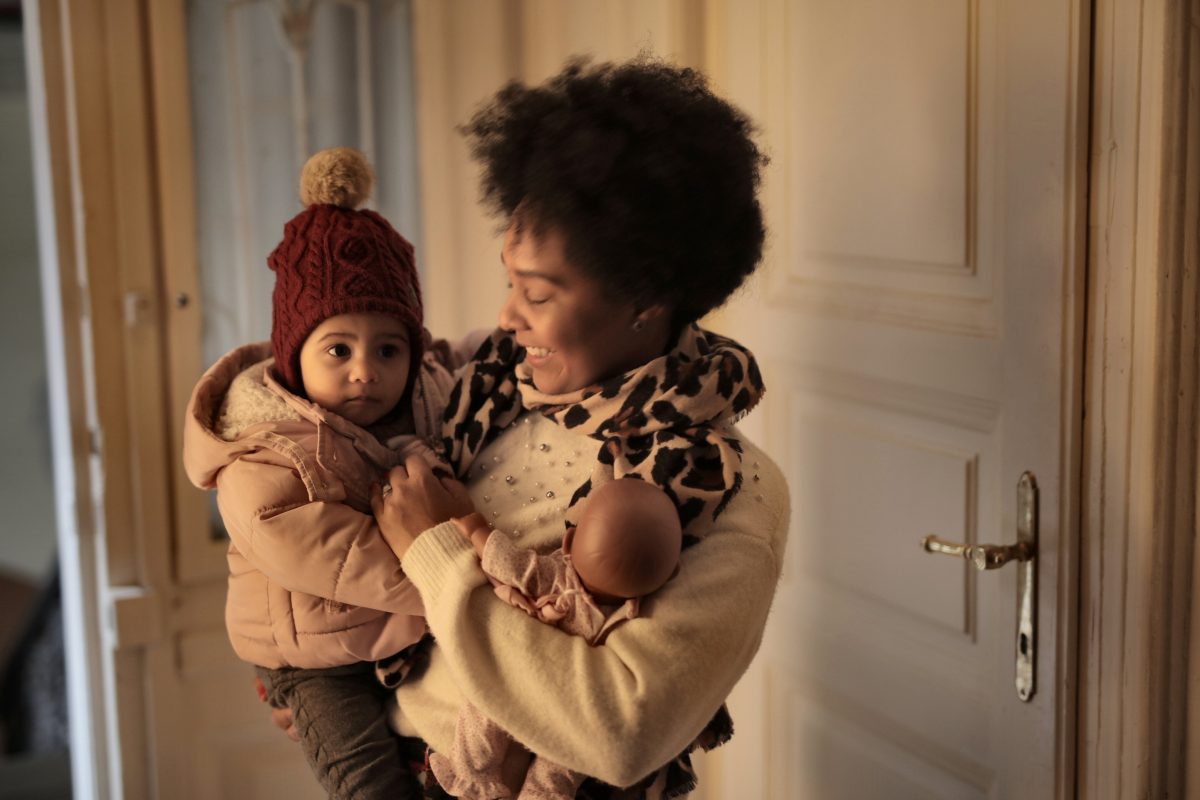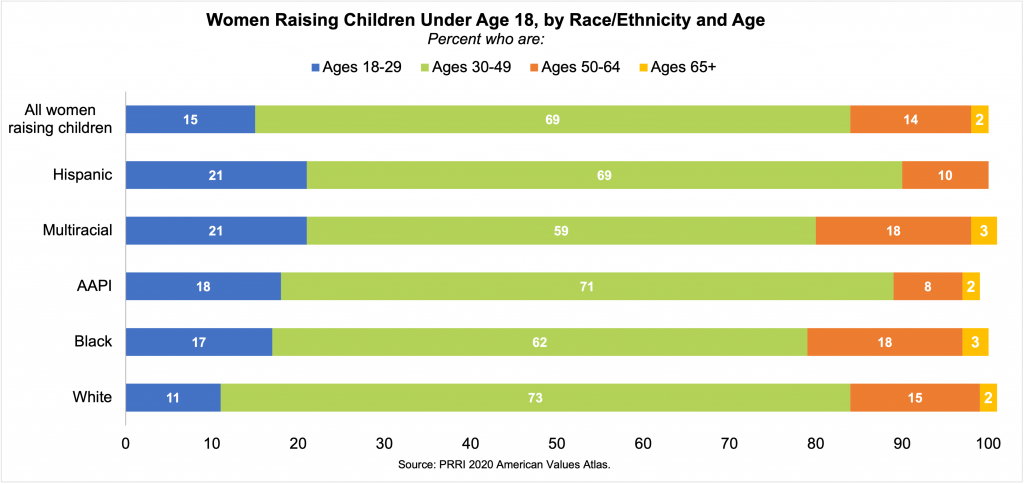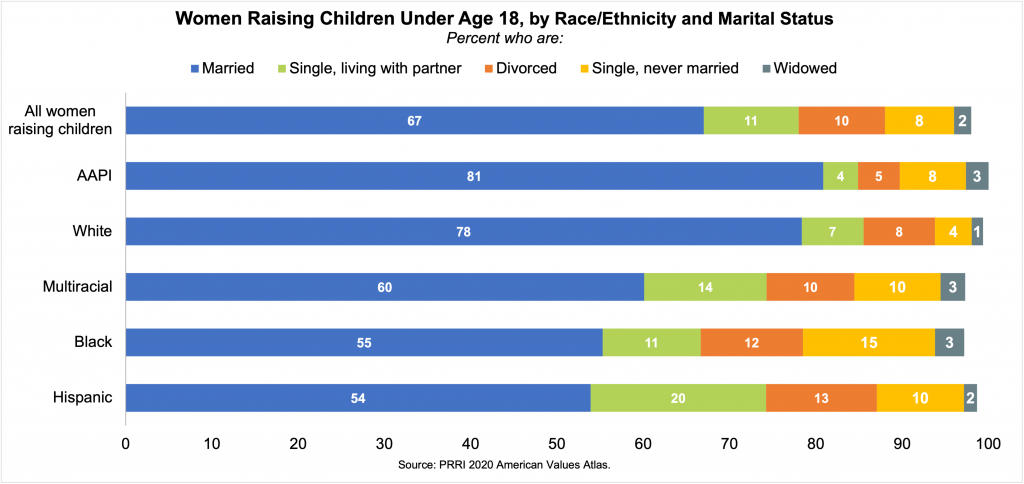Women Raising Children in the U.S. Are Young and Diverse

Each year in early May, the United States celebrates Mother’s Day, created by Anna Jarvis in 1908 and officially recognized in the United States as a holiday in 1914 to honor women raising children. As we celebrate Mother’s Day, we celebrate all forms of motherhood, including all women with children whether they are raising their own children, other family members, adopted children or foster children, or other family situations. PRRI data shows that women with children under age 18 in the household are a young and racially, religiously, and politically diverse group.
PRRI’s 2020 American Values Atlas shows that about one in five Americans (21%) are self-identified women who care for children under 18. Not surprisingly, nearly seven in ten women caring for children under age 18 (69%) are ages 30-49, 15% are ages 18-29, 14% are ages 50-64, and 2% are ages 65 and over. A slim majority of American women caring for children under 18 are white (51%), whereas 26% are Hispanic, 14% are Black, 3% are multiracial, 3% are Asian and Pacific Islander (AAPI), and 1% are Native Americans. Hispanic (21%) and multiracial (21%) women caring for children under age 18 are more likely to be ages 18-29 than AAPI (18%), Black (17%), and white (11%) women caring for children under 18. Conversely, white (73%) and AAPI (71%) women caring for children under age 18 are more likely to be ages 30-49 compared to Hispanic (69%), Black (62%), and multiracial (59%) women caring for children under age 18.

About two-thirds of women who care for children under 18 are married (67%), while the rest are single and living with a partner (11%), divorced (10%), single and never married (8%), or widowed (2%). When looking at marital status by age, 43% of young women ages 18-29 who are caring for children under 18 are married, 26% are single and never married, 24% are single and living with a partner, 6% are divorced, and 1% are widowed. Among women ages 30-49 who are caring for children under 18, nearly three in four are married (73%), and the rest are single and living with a partner (10%), divorced (10%), single and never married (5%), or widowed (1%). Seven in ten women ages 50-64 who are caring for children under age 18 are married (70%), 15% are divorced, and small percentages are widowed (5%), single and living with a partner (5%) or single and never married (4%).
Among white women who care for children under 18, 78% are married, while 8% are divorced, 7% are single and living with a partner (7%), 4% are single and never married, and 1% are widowed. Among Black women who care for children under 18, 55% are married, 15% are single and never married, 12% are divorced, 11% are single and living with a partner, and 3% are widowed. Among Hispanic women who care for children under 18, 54% are married, 20% are single and living with a partner, 13% are divorced, 10% are single and never married, and 2% are widowed. Most AAPI women who care for children under 18 are married (81%), while 8% are single and never married, 5% are divorced, 4% are single and living with a partner, and 3% are widows. Finally, among multiracial women who are caring for children under 18, 60% are married, 14% are single and living with a partner, 10% are single and never married, 10% are divorced and 3% are widowed.

Women who care for children under age 18 are also religiously diverse. One in five (21%) identify as religiously unaffiliated, while 15% each are Hispanic Catholic and white mainline Protestant. About one in ten are white evangelical Protestant (11%), Black Protestant (9%), and white Catholic (9%), while fewer are Hispanic Protestant (7%), other Christians (5%), non-Christian religions (5%), and other Protestants of color (3%).
Finally, these women are politically diverse as well. Around three in four American women who are caring for children under 18 (76%) say that they are registered to vote, while 23% say they are not registered. About four in ten women with children under age 18 identify as independent (39%), 37% identify as Democrats and 19% identify as Republican. Not surprisingly, the majority of American Democrat women who are caring for children under 18 identify as liberal (47%), compared to 27% who identify as moderate and 6% who identify as conservative. By contrast, about two-thirds of Republican women who are caring for children under 18 (66%) identify as conservatives, compared to 26% who identify as moderate and 6% who identify as liberal. Among independent women who are caring for children under 18, 43% identify as moderate, 26% as liberal, and 27% as conservative.

